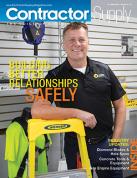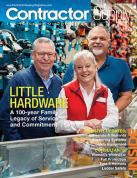Exclusive: Safety tips for essential contractors on home maintenance jobs
These six COVID-19 safety practices can help contractors and customers stay safe during home maintenance calls.
By Megan R. Nichols
 With much of the world on lockdown during the COVID-19 coronavirus pandemic, government leaders published lists of essential businesses and types of necessary workers. Contractors that carry out home maintenance are often among those that can keep working. The risky thing about their duties is that they require entering residences. Here are some crucial tips for contractors to follow if their work does or may involve going into other people's homes.
With much of the world on lockdown during the COVID-19 coronavirus pandemic, government leaders published lists of essential businesses and types of necessary workers. Contractors that carry out home maintenance are often among those that can keep working. The risky thing about their duties is that they require entering residences. Here are some crucial tips for contractors to follow if their work does or may involve going into other people's homes.
Establish Effective Ways to Maintain Social Distancing
People around the world are now practicing social distancing by keeping at least 6 feet away from others. It doesn't come naturally for many of them, however. Contractors should keep that in mind by exploring what actions they can take to remind people to keep their distance during a service call.
One option may be to implement a temporary wall. Although contractors often do that to contain the wood particles associated with carpentry projects, they could apply the technique for other reasons to create physical boundaries around their workspaces.
Contractors may even request that the client stays in the nearest room with the door open during an appointment. That way, they can communicate with the customer as needed maintaining a safe distance.
Plus, contractors must remember that social distancing starts the moment they knock on someone's door. After doing so, they should stand back from the entryway and announce themselves so the customer knows to admit them. Then, they should remain mindful of keeping the proper distance as the client explains their needs.
Clarify Any Changes to Service Procedures or Organizational Practices
Contractors and the companies employing them should also set expectations for customers if any of their processes or services are different due to the coronavirus outbreak. For example, Turner Pest Control created a dedicated section on its website. It explains that all customers should allow the technician to sign for the receipt of services on their behalf. This prevents the exchange of the tablet or smartphone the service provider carries.
Moreover, although the company still offers interior and exterior treatments, it specified that people could request outdoor services only if they want to keep the contractors from coming inside.
Another company, Ranck, has issued a similar statement on their website regarding how their heating, plumbing and other HVAC services have changed in light of recent events. Since contractors must enter the home to provide this essential service, employees are asking customers if they’ve been exposed to the virus and will reschedule if that’s the case. They’ve also changed certain processes while in-home. Contractors are now encouraged to keep interactions to a minimum to keep both the client and themselves safe. They must also wash their hands more frequently & are asked not to shake hands with homeowners at this time.
Informing customers of what's new also assures them you are still operating. Some home maintenance workers in California said the coronavirus substantially decreased their workloads, and that some people assume they’re not open for business. If you take the time to explain what's different now, current and potential customers won't come to incorrect conclusions.
Understand the Risks Associated With the Property
Home maintenance workers perform risk assessments to ensure they are as well-equipped as possible for a job. Employees show up with the necessary equipment and knowledge to keep themselves and others safe. They should take a similar approach to COVID-19. The U.S. Occupational Safety and Health Administration (OSHA) acknowledged that in-home repair workers are at an increased risk of exposure. The guidance from the organization also cautioned that they are in at least the medium-risk category.
OSHA suggests that maintenance companies should remain aware of the overall community transmission risk for the area. Then, contractors should only agree to enter homes if no residents are confirmed or suspected coronavirus cases.
That's easiest when deciding whether to go into a single-family home, but could become impossible when assisting a client who lives inside an apartment building with hundreds of units. The whole household associated with a maintenance contractor's customer may be healthy, but what about the people who live next door or across the hall? Contractors must also be aware of how stair railings, elevator buttons and door handles are high-touch surfaces in any apartment building.
Conducting an adequate risk assessment means first understanding what protective measures a maintenance company has for its workers. Does the enterprise have an ample supply of personal protective equipment? Has it taught workers to take special steps during this outbreak? What are the risks connected to the client and that person's home or housing facility?
Insist on Getting Supplies of Gloves, Masks and Hand Sanitizer
In late March, BuzzFeed News covered allegations from employees of Spectrum, the communications and cable company. They complained that the employer gave no supplies to protect them from the virus and that they were sometimes even unable to wash their hands at a customer's home because of a lack of soap.
Fortunately, many service providers who depend on contractors do ensure those workers have what they need to stay safe. When that doesn't happen, contractors should investigate ways they can personally reduce the risks. That may mean continually putting pressure on the employer to provide supplies while simultaneously trying to source items independently.
In the most severe situations, a contractor may decide to stop working unless they get personal protective equipment (PPE). Another option is to stipulate to customers that they must have an accessible bathroom stocked with soap for the worker to use.
Consider Only Taking Emergency Appointments
Home maintenance providers may also decide they will only come to customers' homes in urgent situations. For a plumber, that may mean they'll tackle major water line clogs, broken water heaters and leaks causing severe floods. They won't come to someone's abode to install a toilet when the person has another functional one to use.
If contractors take that step, they must also edit their contracts to reflect the new specifics. When turning down some jobs is not feasible, companies can at least remind customers of the risks and urge them to carefully think about whether they need the work done now or could wait until the coronavirus risk reduces.
Publish a List of Things Customers Could Do to Make the Job Safer
Many people familiar with home maintenance contracting have weighed in to suggest how customers could increase safety for workers during the pandemic. Companies that hire contractors should strongly consider making a list of suggested tips for clients to follow. They might include:
- Creating a clear path to the work area so contractors do not have to brush up against and move chairs or other items to reach it
- Keeping doors open when possible to eliminate the need to come in contact with handles and knobs
- Providing credit or debit card information in advance to prevent exchanging cash
- Talking to young children to explain how they must stay away from a contractor at work
- Replacing cloth towels with paper ones for better sanitation when drying one's hands
Such a list should ideally conclude with a reminder that the safest thing someone can do is cancel their appointment if they feel ill. Contractors could also provide a link to a form that lets someone do that online or gives the company's phone number for maximum convenience.
Safety Is a Team Effort
Besides following these actionable strategies, contractors should remember that everyone has a role to play in COVID-19 safety. At the contractor level, that means not coming to work if they feel sick and learning how to use protective equipment properly. Companies should take part in boosting safety by engaging with local health authorities to learn about the area's risk level, plus keep contractors supplied with essentials.
Finally, customers should understand the risks any contractor faces when entering an unfamiliar home. They should actively reduce the threats and promptly reschedule or cancel appointments applicable.
The coronavirus is causing unprecedented situations, and scientists are learning more about the virus by the day. Thus, staying safe and keeping others from harm requires staying abreast of developments as they emerge. CS
Megan R. Nichols is a technical writer and blogger. She’s covered several industrial industries including manufacturing, HVAC and construction for sites like SNIPS Magazine, Manufacturing Tomorrow, and Thomas Insights. Megan also publishes easy to understand manufacturing articles on her blog, Schooled By Science, to encourage others to take an interest in this industry.
















